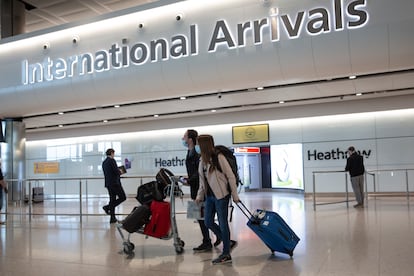Britain reimposes 14-day quarantine for travelers from Spain
The measure, which will come into effect on midnight Saturday, comes in response to the rising number of coronavirus cases in Spanish regions such as Catalonia and Aragón

The British government has decided to remove Spain from a list of countries exempt from quarantine measures in response to the rising number of coronavirus cases recorded in Spanish regions such as Catalonia, Aragón and Murcia. According to the British Transportation Ministry, from midnight Saturday, all travelers coming from Spain to the United Kingdom must self-isolate for 14 days. Failure to comply could result in fines of up to €1,000 and lead to criminal charges in case of repeated breaches.
“Protecting public health is our absolute priority and we have taken this decision to limit any potential spread to the UK. We’ve always been clear that we would act immediately to remove a country where necessary,” said a government spokesperson.
Protecting public health is our absolute priority and we have taken this decision to limit any potential spread to the UKSpokesperson for British government
The British Foreign Affairs Ministry has also changed its travel recommendations for Spain and now suggests that British citizens avoid non-essential trips to the Spanish “peninsula.” Paradoxically, the Canary Islands and Balearic Islands are not included in the new guidelines, even though travelers coming from the two archipelagos will need to go into quarantine upon their return to Britain.
“Both our list of quarantine exemptions and the FCO [Foreign & Commonwealth Office] travel advice are being updated to reflect these latest risk assessments,” explained the government spokesperson.
The decision comes just 15 days after Spain was included on a travel corridor list of 59 countries where people do not have to self-isolate when arriving into the UK. The British government announced at the time of the decision that it would revise this list every three weeks and put in place a “traffic light system” to categorize the level of risk of coronavirus contagion in the respective countries and modify prevention measures. On Thursday, it made its first revision and decided to withdraw several countries from the list including the Czech Republic and Estonia – but not Spain, despite media speculation.
The Scottish government announced on Saturday that it will also reintroduce quarantine measures for travelers arriving from Spain. “Having reviewed the latest data earlier today, the Scottish government is also reimposing 14-day quarantine for travelers returning from Spain. This reinforces the point that these matters are subject to change at short notice and so my advice is to be cautious about non-essential foreign travel,” Scottish Prime Minister Nicola Sturgeon wrote in a message on Twitter.
Having reviewed the latest data earlier today, @scotgov is also reimposing 14 day quarantine for travellers returning from Spain. This reinforces the point that these matters are subject to change at short notice & so my advice is to be cautious about non essential foreign travel https://t.co/9xSnyFCv77
— Nicola Sturgeon (@NicolaSturgeon) July 25, 2020
Thousands of British tourists are already in Spain and many more have reserved tickets for the upcoming weeks. Tour operators in Britain are expecting an avalanche of cancellations and early returns in response to the news. British-German travel group TUI announced on Sunday that it was canceling all holidays to mainland Spanish up to and including August 9. Flights to the Balearic and Canary Islands, however, will not be affected by the decision.
“We know how much our customers look forward to their holiday abroad and some will be able to accommodate the new quarantine restrictions, therefore all those that wish to travel to the Balearic Islands and Canary Islands will be able to travel as planned from Monday July 27,” the operator said in a statement.
Britain continues to record a higher number of coronavirus cases and deaths than Spain, but fierce criticism of the British government’s handling of the crisis has led the Boris Johnson administration to introduce stricter controls and slow down the deescalation process in the country.
English version by Melissa Kitson.
Tu suscripción se está usando en otro dispositivo
¿Quieres añadir otro usuario a tu suscripción?
Si continúas leyendo en este dispositivo, no se podrá leer en el otro.
FlechaTu suscripción se está usando en otro dispositivo y solo puedes acceder a EL PAÍS desde un dispositivo a la vez.
Si quieres compartir tu cuenta, cambia tu suscripción a la modalidad Premium, así podrás añadir otro usuario. Cada uno accederá con su propia cuenta de email, lo que os permitirá personalizar vuestra experiencia en EL PAÍS.
¿Tienes una suscripción de empresa? Accede aquí para contratar más cuentas.
En el caso de no saber quién está usando tu cuenta, te recomendamos cambiar tu contraseña aquí.
Si decides continuar compartiendo tu cuenta, este mensaje se mostrará en tu dispositivo y en el de la otra persona que está usando tu cuenta de forma indefinida, afectando a tu experiencia de lectura. Puedes consultar aquí los términos y condiciones de la suscripción digital.









































